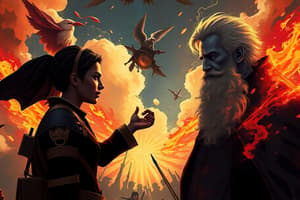Podcast
Questions and Answers
What is the fundamental cause of crime according to conflict theory?
What is the fundamental cause of crime according to conflict theory?
- Individual moral failings
- Psychological disorders
- Social and economic forces (correct)
- Lack of education
How does conflict theory describe the role of the criminal justice system?
How does conflict theory describe the role of the criminal justice system?
- It seeks to maintain equality across social classes.
- It is a tool for the elite to control the poorer classes. (correct)
- It primarily protects the rights of marginalized communities.
- It adapts laws based on collective societal agreement.
Which of the following is NOT one of the primary assumptions of modern conflict theory?
Which of the following is NOT one of the primary assumptions of modern conflict theory?
- Competition over scarce resources
- Conflict leads to revolutionary change
- Adaptation through consensus (correct)
- Structural inequality
What role does revolution play in conflict theory?
What role does revolution play in conflict theory?
According to conflict theory, how do social classes relate to competition?
According to conflict theory, how do social classes relate to competition?
What is the main focus of critical criminology?
What is the main focus of critical criminology?
Which of the following is NOT a core concept of critical theory?
Which of the following is NOT a core concept of critical theory?
How does critical theory aim to contribute to social understanding?
How does critical theory aim to contribute to social understanding?
Who are considered the most likely victims of oppressive social relations, according to critical criminology?
Who are considered the most likely victims of oppressive social relations, according to critical criminology?
What historical figures influenced the concept of 'critique' in critical theory?
What historical figures influenced the concept of 'critique' in critical theory?
Flashcards are hidden until you start studying
Study Notes
Conflict Theory (Karl Marx)
- Crime is a result of societal conflicts among different social classes.
- Laws arise from necessity due to conflicts, not from consensus.
- Social and economic forces are fundamental causes of crime.
- The criminal justice system primarily serves the interests of wealthy elites.
- Policies are designed to control the poor and protect powerful interests.
- Social elites impose their moral standards on the entire society.
- The middle class often aligns with elites, hoping to ascend the social ladder.
- Competition between social classes is central to understanding conflict theory.
Four Primary Assumptions of Modern Conflict Theory
- Competition: Scarcity of resources (money, leisure, etc.) drives all social relationships; competition is more prevalent than consensus.
- Structural Inequality: Power and reward inequalities are inherent in social structures, maintained by benefiting individuals or groups.
- Revolution: Societal change occurs through conflict between competing class interests, often resulting in abrupt, revolutionary change.
- War: War acts as a unifier for societies involved and can lead to the end of some social groups.
Critical Theory
- Critical theory posits that laws and definitions of crime are created by societal elites to maintain control.
- Crime is viewed as a product of oppression, especially among poorer sections, women, and ethnic minorities.
- Critical criminology focuses on the contextual factors surrounding crime, critiquing mainstream criminological topics.
Core Concepts of Critical Theory
- Critical social theory should explore society's history and configuration at specific times.
- It aims to enhance societal understanding by integrating multiple disciplines, including geography, economics, and sociology.
- The goal of critical theory is to reveal and dismantle ideologies justifying social or economic oppression.
- This approach seeks to enlighten individuals about their oppression, contributing to their liberation.
- Influenced by Kant and Marx, the concept of "critique" seeks to examine limitations of knowledge and social conditions.
Studying That Suits You
Use AI to generate personalized quizzes and flashcards to suit your learning preferences.




